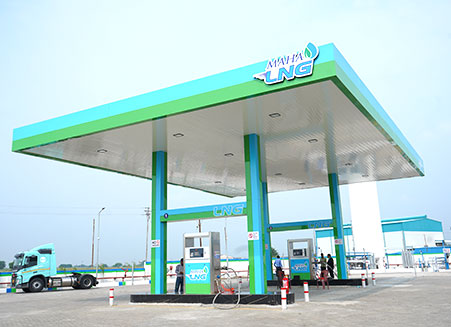Customer Zone

LNG offers significant economic advantages, including cost savings, job creation, and energy security, while also delivering important non-economic benefits like environmental protection and community development. These factors make LNG an appealing choice in the global energy landscape. Liquefied Natural Gas (LNG) offers a range of economic and non-economic benefits. Here’s a breakdown of both categories:
Economic Benefits
Cost-Effectiveness
Lower Prices: LNG can be cheaper than other fossil fuels in many regions, reducing energy costs for consumers and businesses.
Stable Prices: LNG markets can provide more stable prices compared to other energy sources, lessening vulnerability to price volatility.
Job Creation
Employment Opportunities: The LNG industry creates jobs in various sectors, including construction, operation, maintenance, and logistics.
Energy Security
Diversification: Utilizing LNG can diversify energy sources, enhancing energy security and reducing dependence on single energy suppliers.
Domestic Production: Countries with natural gas reserves can use LNG to boost domestic production, decreasing reliance on imports.
Infrastructure Investment
Development: The establishment of LNG retail outlets which will stimulate investment in infrastructure, benefiting local economies.
Support for Industry
Industrial Growth: LNG can support the growth of energy-intensive industries by providing a reliable and cost-effective energy source.
Non-Economic Benefits
Environmental Benefits
Lower Emissions: LNG produces significantly lower greenhouse gas emissions compared to coal and oil when burned, contributing to cleaner air.
Reduced Air Pollution: The combustion of LNG emits fewer pollutants (e.g., sulphur dioxide, particulate matter) that contribute to smog and health issues.
Energy Efficiency
High Efficiency: LNG is efficient for long haul transport with higher efficiency rates compared to other fossil fuels, resulting in less fuel consumption for the same energy output.
Flexibility and Reliability
Supply Flexibility: LNG can be transported over long distances, allowing supply to reach markets that are not connected to pipelines.
Community Development
Local Investments: LNG projects often invest in local communities, improving infrastructure, education, and public services.
LNG Truck OEMs
LNG truck OEMs (Original Equipment Manufacturers) specialize in designing and manufacturing trucks that run on liquefied natural gas (LNG). These manufacturers play a crucial role in promoting cleaner transportation solutions and reducing emissions in the freight and logistics sectors. LNG truck OEMs are pivotal in the transition toward cleaner transportation. By developing innovative LNG-powered trucks, they contribute to reducing emissions, enhancing fuel efficiency, and promoting sustainability in the logistics industry. As infrastructure and technology continue to improve, the adoption of LNG trucks is likely to grow, benefiting both the economy and the environment. Here’s an overview of key aspects related to LNG truck OEMs:
Key Features of LNG Trucks
Engine Technology
Dedicated LNG Engines: Trucks are equipped with engines specifically designed to operate on LNG, offering similar performance to diesel engines while producing lower emissions.
Dual-Fuel Engines: Some trucks use dual-fuel systems that can run on both LNG and diesel, providing flexibility in fuel usage.
Fuel Storage
Cryogenic Tanks: LNG trucks are fitted with insulated cryogenic tanks to store LNG at extremely low temperatures, ensuring the fuel remains in liquid form.
Range and Efficiency
Extended Range: LNG trucks typically offer a longer range compared to traditional compressed natural gas (CNG) trucks, making them suitable for long-haul applications.
Depending on number of LNG tanks in a truck the total distance covered per fill will be in the range of 600 to 1200 km.
Operational Cost Savings: Lower fuel costs and reduced maintenance expenses contribute to overall cost savings
Benefits of LNG Trucks
Environmental Impact
Lower Emissions: LNG trucks produce significantly lower greenhouse gas emissions compared to diesel trucks, including reduced nitrogen oxides (NOx) and particulate matter.
Compliance with Regulations: Utilizing LNG helps companies comply with increasingly stringent environmental regulations.
Economic Advantages
Fuel Cost Savings: LNG often costs less than diesel, providing economic benefits over the long term.
Government Incentives: Many regions offer incentives for adopting cleaner fuel technologies, which can further reduce costs.
Notable LNG Truck OEMs
Volvo Trucks
Offers LNG-powered trucks with advanced engine technology designed for long-haul transportation.
Click hereAshok Leyland
Provides a range of LNG trucks, focusing on sustainability and efficiency in transportation.
Click hereBlue Energy Motors
Manufactures LNG trucks with a focus on reducing emissions and enhancing fuel efficiency.
Click hereTata Trucks
Offer LNG options in their heavy-duty truck lines, promoting cleaner transportation solutions.
Click hereRetrofitters
Shigan
Mukesh – BD Head
9958363647





